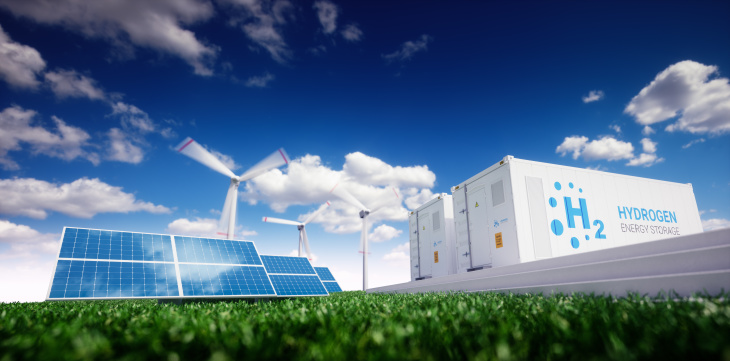Hydrogen project HyCare launched
Hydrogen researchers at Helmholtz-Zentrum Geesthacht are involved in a large European project on hydrogen storage. The goal is to develop a novel prototype tank that will store at least 50 kilograms of hydrogen in a minimum space. The European Union is funding the project with €2 million in the frame of the “Fuel Cells and Hydrogen Joint Undertaking - FCH JU”. Some €150,000 are earmarked for the Helmholtz researchers.

© Malp – stock.adobe.com
Renewable energy from sunlight or wind power is subject to seasonal and daily fluctuations: no electricity is generated at night or if there is no wind. And electricity demand peaks during a few hours of the day, which don’t always correspond to the production period. For this reason, the challenge of energy storage must be solved; one option is using hydrogen as an energy carrier: surplus electricity is used to split water into hydrogen and oxygen in an electrolyser. The hydrogen from this process is stored. When wind turbines stop and the sun doesn’t shine, the hydrogen is converted back into electrical and thermal energy, for example in a fuel cell or a gas engine. Compared to large-scale batteries, hydrogen allows much more energy to be stored in a small space at lower cost.
Currently, hydrogen is mostly stored as a gas in pressurised tanks, or as a liquid at extremely low temperatures. Alternatively, hydrogen can be taken up by a metal powder under more favourable conditions, i.e. at room temperature and at moderate pressure levels, and stored in a very space-saving manner as a so-called metal hydride. This is exactly what the HyCARE project aims at (Hydrogen CArrier for Renewable Energy Storage) – to construct a prototype of a novel, compact metal hydride tank. One example of its new features: a phase change material is used for the thermal management of the envisaged plant, which increases the overall energy efficiency of the storage process considerably.
Tank with three and a half to five tonnes of metal powder
The metal hydride tank developed in the course of the project will hold three and a half to five tonnes of metal powder. It will store at least 50 kilograms of hydrogen, the largest amount of hydrogen stored for civil use in Europe using this technology. The tank will use the same pressure-resistant casing as a conventional pressurised gas tank. However, due to the use of a metal hydride, the space required for hydrogen storage is reduced to about one tenth, maybe even one twentieth. This kind of tank is thus ideal for storing large amounts of hydrogen in a minimum space. A comparison: a metal hydride tank for 50 kilograms of hydrogen would only be about one to two cubic meters in size and could be charged at a pressure of only 20 bar, whereas a conventional 20-bar high-pressure gas tank would have a volume of around 25 cubic metres.
A total of nine project partners from all over Europe are participating in the HyCARE project. The project is coordinated by the University of Turin. Other project partners: the French energy corporation ENGIE, which will make its laboratories in Paris available for the demonstration plant. The plant itself is being built by two medium-sized enterprises, the German company Stühff GmbH from Geesthacht and the Italian company Tecnodelta S.r.l., Turin. The storage material optimised in the project is produced by GKN Sintermetals, Radevormwald. In addition to Helmholtz-Zentrum Geesthacht, the project is also supported by research teams from the Italian Fondazione Bruno Kessler in Trento, the French Centre National de la Recherche Scientifique - CNRS in Paris and the Norwegian Institutt for Energiteknikk in Kjeller north-east of Oslo. As a subcontractor of the University of Turin, the "Environment Park", Turin, will be responsible for communication and media work, among other things.
www.hycare-project.eu
Contact

Helmholtz-Zentrum Geesthacht
Phone: +49 (0) 4152 / 87 - 2565
Fax: +49 (0) 4152 / 87 - 2625
E-mail contactInstitute for Materials Research, Division Materials Technology

Helmholtz-Zentrum Geesthacht
Phone: +49 (0) 4152 / 87 - 1784
E-mail contact